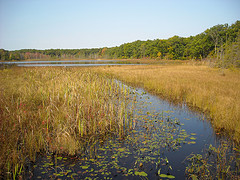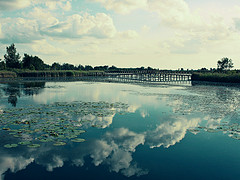Gov. Jennifer Granholm’s plan to hand wetland regulation over to the federal government is drawing criticism from environmentalists and the home builders lobby. The green groups say the move could leave the Great Lakes state with the weakest wetland protections in the country, while the builders say the change could slow the turnaround time for developers seeking building permits.
Granholm announced the proposal in her State of the State address this week as a way to eliminate $2 million of the state’s $1.5 billion budget deficit.
“I will recommend returning enforcement of wetlands protections to the federal government where more staff exists to effectively safeguard our natural resources,” Granholm said. The very next business day a Republican bill (pdf) to do just that was introduced in the House.
The change in regulation would mark a drastic break from Michigan’s landmark 1979 Wetland Protection Act, which took away the federal government’s primary responsibility for regulating wetlands and set up a more stringent state definition of regulated wetlands. Since the ’80s, Land and Water Management division staff in each of the Department of Environmental Quality (DEQ) branch offices across the state have processed thousands of permit applications each year. In order to eliminate the budget for wetland oversight, the legislature must repeal the 1979 law.
DEQ spokesman Bob McCann said that chronic underfunding has made it nearly impossible for the agency to fully carry out it’s responsibilities of oversight of wetland development.
Budegetary restrictions mean less less on-site review of permit requests. Staff now does “desk review,” of many projects, McCann said, “and if everything looks good they just approve it.”
Enforcement has also been cut, McCann said. “We are only getting to half of high priority sites.”
At the same time, McCann said that the DEQ now issues wetland development permits within 60 days and suggested that federal agencies my take longer. The wetland permitting process is described in more detail here.
After the DEQ failed to win legislative support for increasing service fees late last year, management in each of the department’s divisions was ordered to identify programs that could be cut.
For the Land and Water Management division, wetland regulation was the only area in which the federal government operates a parallel program and so was identified as a possible cut, though it is not clear that the Army Corps of Engineers, the federal body that processes wetland permits under EPA oversight, has the staff to oversee permits in wetland-rich Michigan.
Environmentalists are scrambling to decipher the implications of Granholm’s proposal.
On his blog, Great Lakes Blogger, Dave Dempsey, a longtime observer of Michigan environmental politics, posted a 2003 letter from DEQ Director Steve Chester. The letter describes the differences between state and federal wetland regulation.
Chester wrote that approximately 930,000 acres or 17 percent of all state wetlands are “isolated” wetlands — those not adjacent to the Great Lakes or inland lakes or streams — that are not clearly protected under the federal Clean Water Act.
“If Michigan indeed repeals its wetland law and returns permitting to the feds, many wetlands covered only by state law will be exposed to destruction,” Dempsey wrote.
There will be no real cost savings, said Nikki Motson, spokeswoman for Michigan Clean Water Action. She said dropping 30 staff people and cutting around $2 million from the budget, “is small beans when you consider that wetlands provide storm and flood protections, filter pollution and are vital to commercial and recreational facilities.”
Motson said that Bush-era changes to the Clean Water Act have made it less clear which wetlands should be regulated and this confusion could result in longer processing time for people seeking permits.
“Michigan has been fighting for federal money to improve waterways,” she said, “but giving up state control of wetlands could under cut our ability to improve water quality. “
Grenetta Thomassey, policy director for the Tip of the Mitt Watershed Council, said that she is worried about what a repeal of Michigan’s wetland law could mean for local water ordinances.
“We have over 40 local wetland ordinances that already exist in this state, she said. “They derive authority from state wetland law.”
Dan Scripps, first-term Democratic representative from Leland, and a member of the Great Lakes and Environment committee which will review the new legislation, said he was surprised at the governor’s wetland proposal.
“My concern is that wait times [for wetland building permits] are going to have to increase dramatically, he said, “This may have the perverse effect of making business leaders in Michigan appreciate how important it is to have a working Dept. of Environmental Quality.”
“It was interesting to hear how the chamber reacted during the State of the State speech [when Granholm announced her plan],” Scripps said. “The people in vocal support of plan were sitting on Republican side of chamber.
“If Michigan dumps its state wetland program, we will have weakest protection for wetlands of any of the Great Lakes states,” he said. “Clearly we’ve got to do some things on the budget side but we are talking about a very small savings and weakening our wetland protections — it doesn’t make sense from environmental, business or a budgetary standpoint.”
Wetland regulation repeal has no active supporters
Brian Shoaf, legislative assistant for Rep. Jim Stamas, the sponsor of the bill to repeal state wetland regulation, named the Michigan Chamber of Commerce, the Michigan Farm Bureau and the Michigan Association of Home Builders as groups that support the legislation “in concept.”
But Lee Schwartz, director of the Michigan Association of Home Builders, said his group opposes the legislation.
In a voicemail response to a Michigan Messenger query about his groups position he said, “We are not supporting sending wetlands back to the feds. We are fervent supporters of keeping that authority with the state. We think we will do a better job of protecting that resource here.”
“This was not necessarily something we were planning on leading on,“ said Doug Roberts Jr., director of environmental and energy policy for the Michigan Chamber of Commerce, “but the governor called for it and we want to be supportive of ways to save money.
“Our members are frustrated with the level service they are getting from the state now,” Roberts said. “We are starting to think the federal government can’t be worse.”
The Michigan Farm Bureau has called for changes to Michigan’s wetland regulation.
Scott Piggott, spokesman for the Michigan Farm Bureau, said that in December Farm Bureau members adopted a resolution on wetlands in which it criticized DEQ protocols and asked to be regulated under federal law which allows more agriculture in and around wetlands without permits.
“We drain a lot properties in Michigan to be able to farm. Depending on how a wetland is defined, this could affect a lot of us.”
Farmers would prefer to deal with the federal government which has less regulates fewer wetlands and allows more agricultural activities in and around wetlands.
Recently the cranberry farmers have been particularly troubled by state wetland rules, he said.
“Was it something that we beat the door down about?” he asked. “No. We were not actively lobbying on the issue.”





